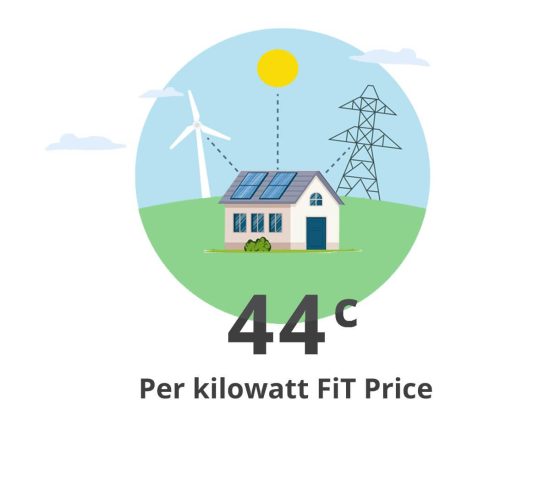Home Solar Panel Rebate Queensland Solar Rebate QLD Solar Bonus Scheme – 44c feed-in tariff
QLD Solar Bonus Scheme - 44c feed-in tariff
Kicked off in 2008, Queensland’s solar bonus scheme offered a 44-cent feed-in tariff (FiT) for every kilowatt-hour of excess electricity returned to the grid. This 44c FiT deal wrapped up in July 2012 and was followed by the regional FiT.
The regional FiT is set by the Queensland Competition Authority each year and is paid to homeowners by power retailers. From July 1 2022, the rate is 9.300 cents per kilowatt hour.

Table of Contents
ToggleIs the 44c FiT still available?
The 44c FiT solar bonus scheme is still running but unavailable to new customers. The current customers who applied before July 2012 (and maintain eligibility) continue to receive the 44c Fit. This is due to expire on 1 July 2028.
How to maintain eligibility
There is a list of criteria that you need to adhere to, to remain eligible for the 44 cent feed-in tariff, they include:
- Consume less than 100kWh per year.
- Maintain an account with an electricity retailer and have a network connection agreement in place
- Live at the same residence, and the homeowner’s name doesn’t change.
How to lose eligibility
It almost seems like the government made a mistake with such a generous scheme and are trying to kick people out. The ways to lose eligibility are as follows:
- Sell or move house
- Increase inverter capacity
- Close electricity account
- Are disconnected for not paying bills
- Add extra capacity
- Use alternative energy sources
- Transfer the name on the electricity account
- Add another name to the electricity account
- Upsize your inverter
What feed-in tariff rates are available in 2023?
In 2023 ass Fit prices are set each year by the Queensland Competition Authority QCA, and as of July 1 2022, the feed-in tariff is set at 9.300 cents per kilowatt hour of solar power produced.
This is a minimum amount, and some retailers do offer more. See here for a full list of Queensland electricity suppliers and their current FiT rates.
How does the feed-in tariff scheme work?
The solar feed-in tariff scheme works by paying residents with a solar power system installed a fee for every kilowatt hour of power they feed into the grid.
Solar panel systems produce most of their power during a small window through the day, generally between 10:30am and 13:30pm. This is when the sun is highest in the sky. Because most people use only 30% of their electricity throughout the day and 70% at night, there must be a way to store the power for later use.
Battery storage
Solar batteries are still very expensive. Currently, there is no solar battery rebate scheme in QLD, so you will need to add about $12,500 on average to the cost of installing solar.
Feed-in tariffs
With feed-in tariffs, you can send power to the grid you are not using through the day, and draw on it at night. Your power provider will pay you a minimum of 9.300 cents per kWh of power. This essentially allows the grid to act as a virtual battery.
Solar bonus scheme update in 2018
Since the solar bonus scheme was introduced in 2008, there have been various amendments to the rules. Changes have been made in 2011, 2012, 2017 and lastly in 2018. The latest is the Battery Booster Program wich ended in May 2024.
The latest changes were to clarify to current customers receiving the 44c FiT can install a battery and add extra panels without losing eligibility to continue with the scheme. Customers could however, lose eligibility if they:
- add power generation capacity which exceeds the approved capacity of their system’s inverter (i.e. oversize)
- install a battery which can be used while customer’s qualifying generator is generating or is able to export electricity to the grid, or
- install an additional solar system.
You can see the document of changes here for further clarification.

Solar Rebate Calculator
Compare Solar Panel Quotes
Table of Contents
Toggle









